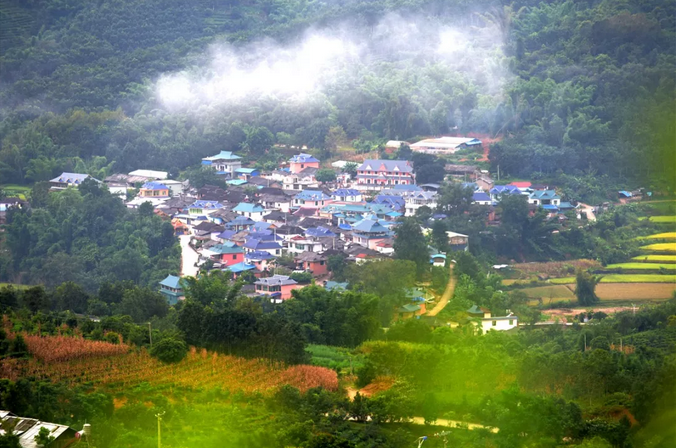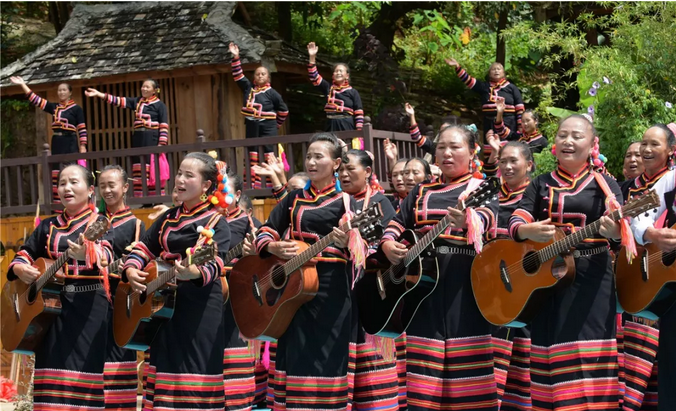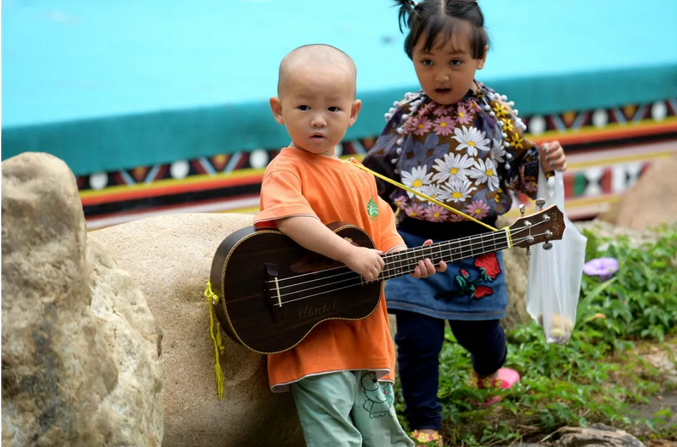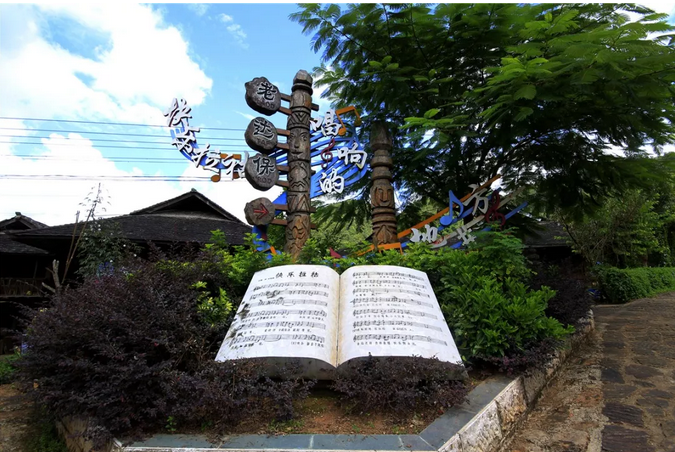Laodabao: The Lahu village of music
Location: Langcang Lahu Autonomous Prefecture, Southwest Yunnan
Households: 114
Laodabao, a traditional Lahu village in Langcang Lahu Autonomous Prefecture, has become widely known for its rich musical heritage. The village, which has 114 households and about 450 villagers, is often referred to as a “treasure house” of Lahu ethnic music. It is also the birthplace of the Lahu epic poem “Mu Pa Mi Pa”, a national intangible cultural heritage.
Musical Fame and the Laodabao Lahu Chorus
The village gained national fame when the Laodabao Lahu Chorus performed the song “Happy Lahu” on CCTV 7 six years ago. The performance helped catapult the song into the public eye, making it a symbol of Lahu culture and music. Since then, the chorus and the village have become iconic in the promotion of Lahu musical traditions.
A Village of Musicians
In Laodabao, music is part of the everyday life of its people. Over 250 of the 450 villagers are guitar players, and music is a shared passion across all generations. Men and women, young and old, are born as singers and dancers, creating an environment where music flourishes naturally.
The village is also home to Li Zhage, a renowned figure in the Lahu community and known as the “Prince of Lusheng” (a traditional reed-pipe wind instrument). He is a national-level inheritor of the “Mu Pa Mi Pa” epic, and often incorporates it into his performances, sometimes even singing the poem while playing his guitar.
The Roots of Lahu Music
Laodabao’s music isn’t just entertainment; it carries the deep cultural heritage of the Lahu people. The epic poem “Mu Pa Mi Pa” tells the story of the creation of the world, and it’s an integral part of the village’s identity. This poem has been recognized as a national intangible cultural heritage, helping preserve and celebrate the Lahu language and traditions.
Local Talent and Artistic Dedication
One of Laodabao’s most prominent figures is Li Naluo, the chairman of the Langcang Laodabao Happy Lahu Performing Arts Company. This company, which performs on prominent stages such as CCTV, is made up entirely of local villagers. Despite their fame, they remain deeply connected to their roots, returning to farming when not performing.
Li Naluo herself is an incredibly talented musician who started playing guitar at the age of 13 and began composing songs at 16. Her popular songs, such as “Unwilling to Leave”, reflect the deep emotional and cultural ties the villagers have to their land. In 2011, Li won the first prize in the Dream Choir Contest held by CCTV, which boosted her career, but she chose to stay in Laodabao rather than pursue opportunities in China’s first-tier cities. To her, Laodabao provides the roots that fuel her creativity, and she is committed to staying and nurturing the next generation of Lahu artists.
Village Life and Cultural Preservation
Though Laodabao’s artists have gained fame, the village remains rooted in traditional farming life. The villagers may perform in national television shows or at cultural events, but at the end of the day, they return to their farms, tending to crops and living a simple, grounded life.
This balance between the modern artistic world and traditional village life exemplifies the spirit of Laodabao—a place where music and heritage are interwoven into daily life, and where the cultural legacy is not only celebrated but continuously nurtured for the future.
Key Highlights:
- Laodabao Lahu Chorus made “Happy Lahu” famous.
- Mu Pa Mi Pa, the Lahu epic poem, is a national intangible cultural heritage.
- Li Zhage, the “Prince of Lusheng,” is a key figure in Lahu music.
- Li Naluo, a talented composer and musician, leads the Langcang Laodabao Happy Lahu Performing Arts Company.
- The village is home to a community of musicians who keep the traditions of Lahu music alive.
Located in southwest Yunnan’s Langcang Lahu Autonomous Prefecture, Laodabao is a Lahu village with 114 households.

Six years ago, the Laodabao Lahu Chorus sang the song “Happy Lahu” in a program broadcasted by CCTV 7, which brought the village to audience nationwide. So it is widely recognized that “Happy Lahu” becomes popular because of the efforts of the Laodabao Chorus.
As a traditional Lahu village, Laodabao is a “treasure house” of Lahu ethnic music. Among the 450 villagers, more than 250 can play guitar. Males and females, old and young, all of them are born as singers and dancers.

With a long history and profound culture, Laodabao is the birthplace of the Lahu people’s epic poem “Mu Pa Mi Pa”, which has been inscribed into the list of the national intangible cultural heritages. Li Zhage, known as the “Prince of Lusheng(a reed-pipe wind instrument)” among Lahu people, is the national-level inheritor of the “Mu Pa Mi Pa”. Whenever he is interviewed, Li would start with the epic poem. He can even sing the poem while playing guitar.

Li Naluo is the chairman of Langcang Laodabao Happy Lahu Performing Arts Company. According to her, all of the actors of the company are local villagers. Though they have performed in many famous stages like CCTV, they are farmers in nature when they are back to the village. Taking off makeup, they still plant and harvest crops.
Like other villagers, Li Naluo is also a very talented musician. She learned how to play guitar when she was 13 years old. And she began to compose songs at 16. Many of her songs are getting popular, including the “Unwilling to Leave”. In 2011, Li Nanuo won the first prize of Dream Choir Contest held by CCTV.

After the success in 2011, Li received many offers from performing companies in China’s first-tier cities. But she refused. In her view, art has its own roots, and Laodabao has the earth for the art she loves. She wants to stay in Laodabao and cultivate more flowers of arts.













